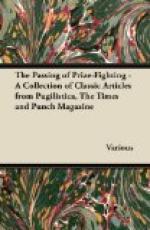Now let us glance for a moment at the substance of the lecture. I should have been glad if Professor KER had had the courtesy to show it to me before it was delivered, instead of my having to wait till it was printed and buy it in a shop, because I might have induced him to repair the more serious errors and omissions in his work. For really, when you come to analyse the lecture, what thin and bodyless stuff it is. Let me at once pay tribute to my colleague’s scholarship and learning, to the variety of his citations. But, after all, anyone can buy a Quotation Dictionary and quote bits out of SWINBURNE. That surely—(see FREIDRICH’S Crime and Quotation, pp. 246-9)—is not the whole task of a Professor of Poetry.
Such a man, if he is to earn his pay, must be able—
(a) to show how poetry is written;
(b) to write poetry;
and it is no good his attempting (a) in the absence of (b). It is no good teaching a man to slope arms if you are unable to slope arms yourself, because a moment will come when he says, “Well, how the dickens do you slope them?” It is no good professing lawn-tennis and saying, “Top-spin is imparted by drawing the racquet up and over,” and so on, if, when you try to impart top-spin yourself, the ball disappears on to the District Railway. Still less is it useful if you deliver a long address to the student, saying, “H.L. DOHERTY was a good player, and so was RENSHAW, and I well remember the game between MCLOUGHLIN and WILDING, because WILDING hit the ball over the net more often than MCLOUGHLIN did.”
Those students who have attended my lectures more regularly than others— and I am sorry there are not more of them—will do me the justice to remember that I have put forward no theory of writing which I was not prepared to illustrate in practice from my own work. My colleague, so far as I can discover, makes one single attempt at practical assistance; and even that is a minor plagiarism from one of my own lectures. He makes a good deal of play with what he calls the principle and influence of the Italian Canzone, which simply means having a lot of ten-syllable lines and a few six-syllable ones. Students will remember that in our second lecture we wrote a poem on that principle, which finished:—
Toroodle—umti—oodle—umti—knife
(or strife)
Where
have they put my hat?
That lecture was prepared on May 27th; my colleague’s lecture was delivered on June 5th. It is clear to me that in the interval—by what discreditable means I know not—he obtained access to my manuscript and borrowed the idea, thinking to cloak his guilt by specious talk about the Italian Canzone. The device of offering stolen goods under a new name is an old one, and will help him little; the jury will know what to think.




